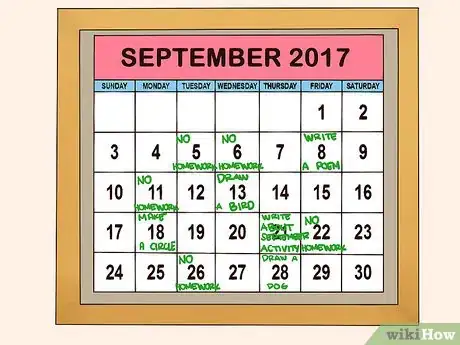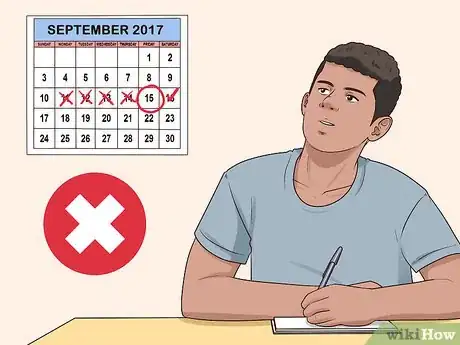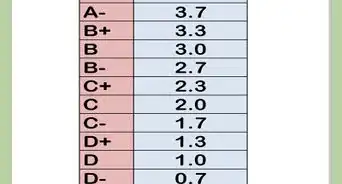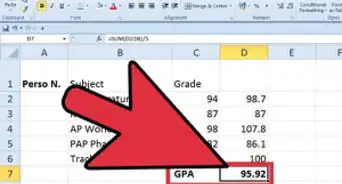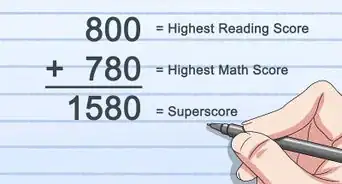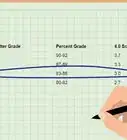This article was co-authored by Jennifer Kaifesh. Jennifer Kaifesh is the Founder of Great Expectations College Prep, a tutoring and counseling service based in Southern California. Jennifer has over 15 years of experience managing and facilitating academic tutoring and standardized test prep as it relates to the college application process. She takes a personal approach to her tutoring, and focuses on working with students to find their specific mix of pursuits that they both enjoy and excel at. She is a graduate of Northwestern University.
There are 10 references cited in this article, which can be found at the bottom of the page.
wikiHow marks an article as reader-approved once it receives enough positive feedback. This article received 67 testimonials and 90% of readers who voted found it helpful, earning it our reader-approved status.
This article has been viewed 639,029 times.
To achieve the first rank in your class, you will have to stay disciplined and study hard throughout the year. Take part in class activities and do all of your homework on time, including reading assignments. Organize your study time, test yourself, and eliminate distractions that will reduce your productivity. Maintain a good attitude and always aim to earn the best grades possible.
Steps
Participation
-
1Sit at the front of the class. Distractions from classmates sitting in front of you can make it very difficult to pay attention in class and keep up with lessons. Choose a seat at the front of the classroom, where you can listen attentively to everything that your teacher says. Being up front will also put you on your teacher’s radar, which will allow them to see you engaging with the lesson and may help you win you extra points with them.[1]
- Being in front will also remove the temptation to pull out your phone, read something that isn’t pertinent to the class, or zone out.
- If you can't move to the front of the class, ask your classmates to let you focus and to not talk to you during class.
-
2Take detailed notes.[2] Absorb the most that you can during each lesson by taking notes in class. Instead of writing down every word your teacher says, listen attentively to pick up on the important details, such as names, dates, and places. Write short, simple sentences that include important keywords from the lesson.[3]
- For instance, "Franz Ferdinand (archduke of Austria) was assassinated on June 28, 1914."
Advertisement -
3Take part in class discussions.[4] Speaking up in class is an excellent way to show that you are keeping up with the course work and thinking about the material thoughtfully. Bring up points and questions that relate directly to the specific lesson or module your class is covering that week. Mention other students’ ideas in a respectful way, either to agree or disagree, to show that you are fully engaged in the conversation.[5]
- For example, say something like, "I agree with Andrea's point about global warming, and I think even more effort can be put into making a change."
- Try to think of questions that will spark further discussion. For instance, "How do you think Shakespeare's Romeo and Juliet might have been different if he had written the play in the age of social media?"
Homework
-
1Make a homework calendar.[6] Juggling coursework for different classes can be tricky so it is important to stay as organized as possible. Keep track of all of your homework due dates and schedule specific time to work on assignments. You can use a day planner or a wall calendar to schedule your homework time, or both if you want extra reminders.[7]
- Try color coding your calendar with colored pens to show the priority level or difficulty of your assignments.
-
2Complete all of your assigned reading on schedule. Follow your course outline or syllabus and do all of your assigned reading on the days it is assigned. This will prepare you to fully participate in class and impress your teacher. You will also be ready for any pop quizzes that might come up.[8]
-
3Shift between subjects when you lose concentration. If you have multiple homework assignments from different classes, shift between them when you start to lose focus. A fresh topic can reinvigorate your mind and ensure that you do not waste any valuable time. Shift between subjects as much as you need to but make sure that all of your assignments are completed by their due date.[9]
- Try focusing on the more difficult subjects first so that you can devote more time to them if you need to.
-
4Avoid handing in homework late. Late assignments are object subject to penalties that will lower your overall grade. Make sure to accurately track the due dates for all of your homework assignments on your calendar and get your work in on time. If you are going to be absent on a day when a homework assignment is due, aim to hand it in early to avoid losing marks.
Studying
-
1Ask your teachers what scores you will have to beat. Class-ranking systems can vary from school to school, using different methods to establish first rank. Ask your teacher how much they think you will have to score on different tests and assignments to achieve first rank. You can also ask how much first rank students in previous years scored to get a sense of how high you should be aiming.[10]
-
2Start studying for exams about 3 weeks early. Do not put off studying what you need to know to ace an exam, which will be a nearly impossible task to complete at the last minute. Give yourself at least 3 weeks to cover all the material you need to know in small, manageable study sessions. Plan these sessions out in advance and make sure that you have enough time to keep up with all of your other course work.[11]
- Planning ahead will remove stress from the studying process, making it easier to concentrate.
- Only do group study with good students who study. If you study with any other students who does not have interest in study they will only distract you.
-
3Test yourself to gauge your progress. While studying for exams, use practice tests or previous years’ exams to test yourself on the course content. Time yourself so that you complete them within the same time frame as they are given in school and score them once you are finished. If you do not attain the scores you need to achieve first rank, schedule additional study time to improve your performance.
- Obtain practice tests for certain subjects online, or ask your teacher for a copy of a previous year’s exam.
-
4Remove distractions. Your cell phone, laptop, television, and radio can all be big distractions during your study time. If possible, opt to study from books and use a paper and pen instead of your computer, which may be a source of many different diversions. Put away your phone and turn off the TV and radio so you can concentrate.
- If you have to use your computer, download software that will block distracting websites while you study.
- If there are too many distractions at home, go to your local library to study in peace.
-
5Study in short bursts. Studying for long periods of time can cause you to lose focus and energy. You will be able to concentrate better after taking 10-15 minutes to relax, and studying will seem less daunting this way.[12]
- Use your break to have a nutritious snack, like an apple or yogurt.
- Watch a short YouTube video or check in with a friend to boost your spirits before going back to studying.
-
6Get a tutor if you need one. Balancing different classes and assignments can make it difficult to keep up in every subject. If you feel that you are having trouble grasping certain topics or staying ahead of your class, look for a local tutor to help you or ask your teacher for extra help. Take this kind of initiative at the first sign that you might need help to keep from falling behind.
Good Behavior
-
1Aim for perfect attendance. Missing class will leave you behind on class work and disrupt your study schedule. It may also disrupt the flow of the classroom if your teacher has to delay a lesson to may sure you are caught up on what you missed. Aim to attend all of your classes and miss school only if you are too sick to go.
- If you do miss class, be sure to borrow class notes from another student and ask to make up any missed assignments.
-
2Be polite and respectful. Being disruptive in class will not only keep you from learning efficiently, it will distract others. Always be respectful to your teacher and classmates, and maintain a positive attitude. Being well-behaved will put you in your teacher’s good graces, which may translate into better grades for effort and participation.
-
3Put away your phone. It can be tempting to look at your cell phone in class, especially if you receive a text message or email. Put your phone on silent and put it away somewhere out of reach so you aren’t tempted to look at it during a lesson. It is not only rude to your teacher to do so, it is detrimental to your concentration and success in class.
- You should also avoid other distracting behaviours, such as passing notes to other students or reading things that are not related to the course.
-
4Do not engage with distracting classmates. Being on your best behaviour in class means avoiding distracting classmates. Do not respond to fellow students who whisper at you or try to pass notes to you during class. Let your classmates know that you are trying hard to focus on your schoolwork when you are outside of the classroom so that they don't bother you once the lesson starts.
Expert Q&A
Did you know you can get expert answers for this article?
Unlock expert answers by supporting wikiHow
-
QuestionHow do you get A's in every class?
 Jennifer KaifeshJennifer Kaifesh is the Founder of Great Expectations College Prep, a tutoring and counseling service based in Southern California. Jennifer has over 15 years of experience managing and facilitating academic tutoring and standardized test prep as it relates to the college application process. She takes a personal approach to her tutoring, and focuses on working with students to find their specific mix of pursuits that they both enjoy and excel at. She is a graduate of Northwestern University.
Jennifer KaifeshJennifer Kaifesh is the Founder of Great Expectations College Prep, a tutoring and counseling service based in Southern California. Jennifer has over 15 years of experience managing and facilitating academic tutoring and standardized test prep as it relates to the college application process. She takes a personal approach to her tutoring, and focuses on working with students to find their specific mix of pursuits that they both enjoy and excel at. She is a graduate of Northwestern University.
Founder, Great Expectations College Prep
-
QuestionHow is your GPA calculated?
 Jennifer KaifeshJennifer Kaifesh is the Founder of Great Expectations College Prep, a tutoring and counseling service based in Southern California. Jennifer has over 15 years of experience managing and facilitating academic tutoring and standardized test prep as it relates to the college application process. She takes a personal approach to her tutoring, and focuses on working with students to find their specific mix of pursuits that they both enjoy and excel at. She is a graduate of Northwestern University.
Jennifer KaifeshJennifer Kaifesh is the Founder of Great Expectations College Prep, a tutoring and counseling service based in Southern California. Jennifer has over 15 years of experience managing and facilitating academic tutoring and standardized test prep as it relates to the college application process. She takes a personal approach to her tutoring, and focuses on working with students to find their specific mix of pursuits that they both enjoy and excel at. She is a graduate of Northwestern University.
Founder, Great Expectations College Prep
-
QuestionWhat do I do if I follow all the steps to get first rank in class but it doesn't work?
 Community AnswerKeep working at it. Study hard and put all your effort into succeeding. Do it because you want to further your education, not just so that you can be first in the class.
Community AnswerKeep working at it. Study hard and put all your effort into succeeding. Do it because you want to further your education, not just so that you can be first in the class.
References
- ↑ http://thelala.com/seven-scientifically-proven-ways-pay-attention-class/
- ↑ Jennifer Kaifesh. Founder, Great Expectations College Prep. Expert Interview. 8 November 2019.
- ↑ https://lifehacker.com/back-to-basics-perfect-your-note-taking-techniques-484879924
- ↑ Jennifer Kaifesh. Founder, Great Expectations College Prep. Expert Interview. 8 November 2019.
- ↑ https://learningcenter.missouri.edu/wp-content/uploads/How-to-Participate-in-Class-Discussion.pdf
- ↑ Jennifer Kaifesh. Founder, Great Expectations College Prep. Expert Interview. 8 November 2019.
- ↑ http://www.scholastic.com/parents/resources/article/homework-project-tips/organize-homework-to-dos
- ↑ https://www.pace.edu/center-academic-excellence/learning-center/new-york-city-campus/musts-for-successful-study/read-your-textbook
- ↑ https://www.princetonreview.com/college-advice/homework-distractions
About This Article
To achieve the first rank in your class, strive to pay attention and participate in class discussions every day. Next, keep your assignments organized, complete your homework for each class, and turn in your assignments on time to keep your grades high. It's also important to study for your exams thoroughly so you can achieve good scores. You may want to ask your teachers what scores you will have to beat, since class-ranking systems can vary from school to school. For tips on studying efficiently, read on!




